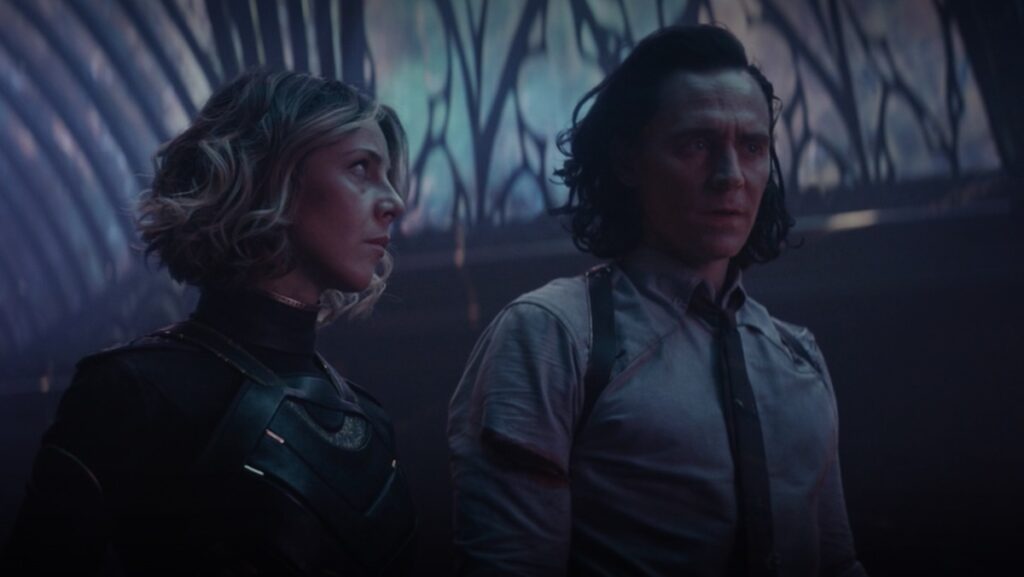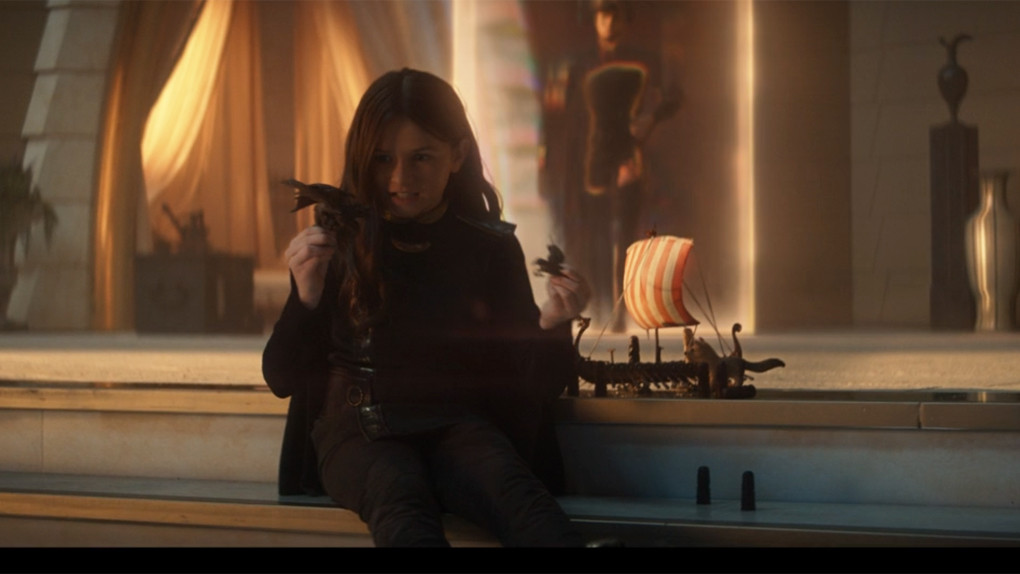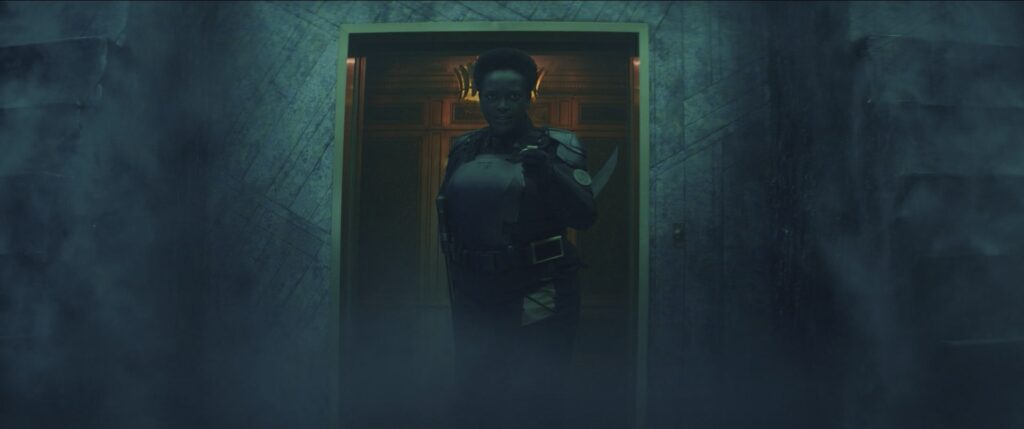
Spoilers for all of Loki Season 1 and The Falcon and the Winter Soldier follow
From the first episode of the Disney+ series Loki, Loki Laufeyson (Tom Hiddleston) has a deconstruction of self handed to him by Mobius (Owen Wilson). The latter shows him a replay of his recent past and where he is destined to go on the Sacred Timeline. This sequence reminds the audience of how Loki justifies his desire to rule others. “I would have made it easy for them,” he says, “The first and most oppressive lie ever uttered was the song of freedom. For nearly every living thing, choice breeds shame, and uncertainty, and regret. There’s a fork in every road, and the wrong path always taken.” But ironically, as he would soon understand, this was the exact purpose of the Time Variance Authority (TVA).
Under the Time Keepers, the ordered universe ultimately has no free will to decide its own destiny. Sure, individuals may be able to make choices, but as long as they don’t stray from the Sacred Timeline and become variants. Otherwise, they’ll be pruned out of existence or be recruited to the TVA. Loki was right in saying that the “song of freedom” was ultimately a lie, but mistaken in thinking that he was the one to bring order. The TVA already had that covered, and he was simply one other cog in their universal machine. He is humbled in learning this, but through his interactions with other variants of himself, particularly Sylvie (Sophia Di Martino), he understands more of the necessity of tearing it down.
Loki is a series about tearing down oppressive structures. Superhero media is always at its best when stories are about challenging the system, instead of seeking to uphold it. This is where Loki brilliantly succeeds, and where its predecessor The Falcon and the Winter Soldier fails. The latter did initially have promising themes explored about the faults in our systems and how we should go about fixing them. But they were undercut by a finale that capitulated to upholding these systems and pruning out the “extremes” (ie the Flag-Smashers) who had valid points to make about how world governments were trying to return to a world that simply didn’t exist anymore post-blip, and that thousands of migrants and refugees would suffer further under it. Loki struck the necessary balance between showing the horrors that the TVA wrought on countless innocent beings and where we might need some order for existence to be safe. But should that require the pruning of a mere child, a Loki variant that would name herself Sylvie, for simply being a girl?

We learn from the real mastermind behind the TVA, He Who Remains (Jonathan Majors), that he created the agency to prevent another Multiversal War, caused by his own various variants. But even if He Who Remains had noble intentions, why is he the one who decides how the Multiversal War should be avoided, especially when it was caused by his own variants? There is something to be said about taking responsibility for your actions, and he does genuinely seem to have the best intentions. But how does that work in effect? Countless variants just innocently living their lives who need to be deleted for the sake of this “order?”
From “Classic Loki” (Richard E. Grant) we learn he was pruned simply for wanting to see his brother Thor again. After he had simply taken himself out of the “main narrative” by hiding out on a remote planet, he was lonely. Apparently, after all this time, this would have thrown things so off-balance for the Sacred Timeline? The TVA and He Who Remains wouldn’t want us to question why exactly this was so wrong, only to uncritically trust their judgment.
Sylve had her life shattered for merely existing. As a cunning Loki, she was able to escape and evade the TVA for years. With their agents always on the hunt for her to literally erase her out of existence, it’s more than understandable why she fought back and killed those numerous agents trying to kill or capture her. This Loki variant had her entire life shaped this way, giving her the singular purpose of taking this agency down and attaining her freedom. In Sylvie, Loki saw someone whose choices had been stripped away but continued to fight back anyway. She, like him, would not have the TVA decide “where the story ends.” It might ideally be best for Sylve to understand the necessity behind the TVA, to preserve trillions of lives from the threat of chaos. But instead, she saw her vengeance through in the Loki finale.
Sylvie, being committed to finishing out her mission of vengeance, sees He Who Remains’ stories as just another lie, all to justify his control. And after all the trauma she had endured due to the TVA, who could blame her? But Loki attempts to stop her, fearful that their unleashing of the multiverse will cause another multiversal war and wanton destruction. He’s not doing this out of any desire to rule. He knows now the futility of trying to control for control’s sake.
Loki is forced to fully confront, in his time-loop prison with Lady Sif, that the reason he was so desperate to control everyone and cause chaos is his own extraordinary insecurity. He feels aimless, and realizes he came to believe that imposing his will over others would bring him his “Glorious Purpose.” It is rather through loving and appreciating himself, literally in the form of his fellow variant Sylvie. It’s not hard to imagine that his realization of the futility of the TVA’s control over the universe is similar, particularly when he learns from Sylvie that the TVA are all variants. There doesn’t seem to be any of the old trickster as he confronts Mobius (Owen Wilson), with this truth. Only a pleading to his friend to let him and Sylvie go, but he likely pleaded for Mobius to free himself as well.
We understand the intentions behind the TVA, but to capitulate to this type of control is extreme. It’s simply the threat of any multiverse whatsoever, even if the variants we see, especially from the Lokis and others presented, are mostly benign (Kid Loki who killed Thor notwithstanding of course). He Who Remains appears incredibly confident that this is the only way to preserve all of existence. But we have only his word to go by. Even though we know as an audience that he is being sincere in his attempts, it is very understandable why Sylvie wouldn’t believe him. This is still the head of an organization that attempted to prune her and all the other variants innocently living their lives.
If a ruling order is taking the fundamental power of choice away from its denizens and makes those who slightly deviate into criminals in this micromanaged dystopia, it’s ultimately not something that anyone would be comfortable knowingly living under. Unless they had some of that power, such as we see from Ryvonna Renslayer (Gugu Mbatha-Raw), who still clung to the overarching structure even as the very Time Keepers crumbled around her. “Free will? Only one person gets free will. The one in charge,” she says to Mobius, knowing that only lies with whoever actually runs the TVA. The last we see of her, she says she goes in search of this free will, likely meaning she will go where that power resides. And it is honestly understandable to a degree, as it’s all she’s ever known.
But this control is ultimately unnatural. The multiverse and its alternate timelines are the natural states of existence. It’s the TVA’s perpetual micro-managing that created the artificial Sacred Timeline. The multiverse, in fact, may represent true freedom, where true choices can thrive. And it doesn’t have to only end with a Kang taking over it all. Again, we have only the word of “He Who Remains,” who manipulated the TVA members into thinking they were doing something truly for the greater good. But like with the variants they pruned, they weren’t truly allowed to make that choice, because the truth of their own variance was kept from them.
We see it particularly with Hunter B-15 (Wunmi Mosaku) when Sylvie shows the Time Agent what her life was truly like before the TVA took her. Through Mosaku’s brilliant, wordless performance in the rain, we see B-15’s renewed nostalgia for the life stripped from her. “I was happy,” she says to Sylve after the psychic remembrance. She was an agent who was steadfastly devoted to the TVA, but once she and Mobius learned the truth about their origins, that they were the very vagaries they were casually pruning, they turned to seek truth and freedom. She takes up the fight against the Time Keepers, even when it comes at a personal cost of her security in this space. But she knows that fight for freedom for her and all the other Variants is worth it, and she saves Loki and Sylvie at that pivotal moment in the Time Keepers’ chamber.

And through meeting Sylvie, literally another version of himself, Loki understands the lie. The revelation in the third episode that the TVA is run by variants is shattering to him, and he attempts to inform them in the fourth episode, to barely any avail. But it isn’t necessarily through wanting to take charge of the TVA or exert his dominance. It’s clear most presently in his friendship with Mobius that Loki understands the inherent value of freedom. And that in turn inspires Mobius to be part of the revolution against the Time Keepers as well. Even though Ryvonna prunes him, he is able to escape the waste-bin dimension just in time.
But Sylvie’s decision to follow through with killing He-Who-Remains upends everything. Now in the end of the season, Loki finds himself in a new reality where no one in the TVA even knows him, and it is now Kang, the original identity of He-Who-Remains, in control. Even though Sylvie’s action was the culmination of her free choice, it may have in fact doomed the multiverse to Kang’s rule.
Despite the dire ending, the themes of free choice vs. control should remain pivotal in Loki’s second season, and the rest of the MCU that this affects. The multiverse or single universe shouldn’t have one ultimate ruler. Loki, Sylvie, B-15, Mobius, and the rest of the heroes of the MCU should continue to rebel to attain freedom from tyranny and attain a real sense of peace, one where everyone can prosper. A hierarchy with time-keepers at the top won’t do that, as we saw in Loki’s first season. Hopefully, these threads will continue, and the liberators will persevere.
Season 1 of Loki is currently available to stream on Disney+.






